When she learned about the new Fordham College Advising Center, then, she was enthusiastic. Her response? “‘This is the best thing you guys can do,’” she said.
The center has drawn funding support from several donors including Smolens since it was formally launched in fall 2022 to revamp student advising at Fordham College at Lincoln Center and Fordham College at Rose Hill.
The center provides more personalized, holistic support from professional advisers who help students complete paperwork, navigate the University, connect with services including mental health counseling, and formulate career plans—allowing faculty members to focus their energies on academic mentoring and students’ professional development.
This new system appeals to Smolens because of how it will help alleviate the anxieties of college life and bolster students’ well-being. “Having someone that’s professionally trained to help students, to deal with students, I think is very, very important,” said Smolens, a retired private equity advisor and investor and member of the Fordham University Board of Trustees. “I am 1000% behind this advising center, and I will give to it every year.”
In light of her experiences as a student, businesswoman, and parent, she has a passion for student advising and the related topic of developing one’s career—as well as the particular challenges facing women.
Tell me about someone at Fordham who made a difference for you.
My senior year, I was taking a class with William T. Hogan, S.J., “the steel priest,” who was running the Industrial Economics Research Institute. He asked me to stay at Fordham for graduate school in economics and be his graduate assistant, and that really was what made my career. I got to be on the phone with CEOs of steel companies with him, and it gave me this whole business perspective that I lacked.
What is some career advice you commonly give to students?
I’ve told my sons and their friends that sometimes your first job may not be your ideal job, but you have to look at it as a steppingstone and ask, is this going to help me do something else? In many ways, there’s no bad experience. Sometimes you don’t even know you’re getting good experience until something happens down the line and you’re like, “Oh, yeah, I know how to deal with this.”
Through your past involvement with Fordham’s Women’s Summit, you’ve helped to highlight the challenges facing women in the workplace. Do you see progress?
I was starting to see it improve, but I’m not sure it’s improving anymore. I still think there’s a different mindset for men and women. Women can advance, but you still have to work harder. I think [the Women’s Summit]is a phenomenal thing that we do at Fordham—in today’s times, for young women to see and hear the stories of successful women is really, really important.
To what extent has the #MeToo movement succeeded?
I’ve always told [people], you just have to be careful. If you give out that persona that you’re not going to take anybody’s nonsense, I think that really helps. Students have called me, asked me for my experiences, and I have talked to them, talked them through things, and I would continue to do that when asked.
How was your Fordham education uniquely valuable to you?
In my career in finance, I’ve seen some very unethical behavior. My parents taught me proper ethics, but Fordham really reinforced it. One of the biggest things you can get out of Fordham education is becoming a truly ethical person in the way you conduct your life, in business and personally.
Gifts toward the Fordham College Advising Center support student wellness and success, one of the pillars of Fordham’s $350 million fundraising campaign, Cura Personalis | For Every Fordham Student. Learn more and make a gift.
]]>He always looks forward to it. “They’re very engaged, and it’s fun to answer questions about my experience … as a business student and somebody who’s immersing into the corporate world,” he said.
Cintron is one of several Gabelli students involved in a program that seeks, among other things, to increase diversity at the Gabelli School by attracting more students from underrepresented groups. Dubbed the Corporate Communications High School Pipeline Program, it’s a way of engaging with Fordham’s New York City community and giving students an opportunity to serve and learn from others, in keeping with the University’s Jesuit mission.
It operates mostly at Catholic high schools. Cintron, a student co-director of the pipeline program, took part in it himself while attending one of those high schools, Cardinal Hayes High School in the Bronx. That makes his teaching especially rewarding, he said. “The program, honestly, gave me the confidence that I would succeed in business, so it’s nice to be able to spread that confidence to other students.”
Because of its potential for enhancing diversity at Fordham by attracting more students from the Bronx, one of the most diverse areas in the United States, “I’m really proud to be part of the program,” Cintron said.
Helping more students from underrepresented communities come to Fordham is one goal of the University’s current $350 million fundraising campaign, Cura Personalis | For Every Fordham Student. To advance this effort, donors have been contributing to the recently established Gabelli Diversity, Equity & Inclusion Scholarship Fund for academically strong students who, like Cintron, came through the pipeline program.
Creating a High School to University Pipeline
Founded five years ago, the pipeline program prepares students for business school through mentoring, corporate site visits, a class on the Fordham campus, and a pitch proposal competition. Working in teams, students at each school devise a strategy for addressing an issue of diversity, equity, and inclusion that arose in a Fortune 500 company. The winning strategy is chosen by a panel of judges drawn from industry.
The class taught by Cintron and other students helps the high schoolers prepare for this competition. Cintron’s fellow student co-director, Luz Perez-Arias, said it’s “amazing” to teach the class because of the students’ eagerness and the research, public speaking, and presentation skills they’re learning. She came through the pipeline program herself as a student at Aquinas High School, which has since closed.
“When these kids learn these skills, they’re going to appreciate it so much when they go to college, because this is something that I’m doing now” as a Gabelli School sophomore, she said. “I know that they’re going to make use out of it, and that makes me happy.”
Cintron and Perez-Arias are recipients of the Gabelli diversity scholarship. It has several contributors, including two lead donors who, as it happens, know what it’s like to be part of an underrepresented group themselves.
Benefactors with Bronx Roots
Eileen Walsh, GABELLI ’76, and Mary Ann Bartels, GABELLI ’85, GSAS ’92, both became supporters of the scholarship via Fordham’s giving circles, a form of participatory philanthropy that grew out of the University’s annual Women’s Summit, for which Bartels has been a keynote speaker.
They were both drawn to support the scholarship because of their own stories. Walsh, a Bronx native and daughter of Irish immigrants, graduated from the Bronx’s Academy of Mt. St. Ursula, now one of the pipeline schools. After graduating from the Gabelli School, she secured a “Big 8” accounting firm job at a time when such a thing was unusual for women.
“I do give credit to Fordham and the Gabelli School for helping me succeed,” she said, “in a very serious position that not many women had at the time.”
She serves as a judge for the pitch competition at the Academy of Mt. St. Ursula and calls it “magical” to see how the students grow through the program.
“They are way ahead of the game,” said Walsh, a retired audit partner at KPMG and member of the Gabelli School advisory board’s executive committee. “They have an idea of what business is, they have an idea of what successful companies are, they have an idea of how poorly and how well the companies may have done because of what they did or didn’t do—and they can give a presentation that will knock your socks off. They effectively know how to work as a team, which in business is huge.”
Bartels also grew up in the Bronx, on City Island. A self-described “risk student,” she was accepted with the help of a strong recommendation from a neighbor who worked at Fordham. “Fordham took a chance on me,” said Bartels, chief investment strategist at Sanctuary Wealth, who believes she would not have had a successful Wall Street career without the help of the University’s faculty and administrators.
She has been giving back to the University for years—as a donor and a member of advisory boards and the President’s Council. The Gabelli scholarship fund caught her interest because she’s well aware of the community it serves. “It’s part of the area that I grew up in, so it really touched my heart,” she said. “To be able to give back to other people in the community that have gifts and talents and can go to, really, an elite institution to further their ability and skillset and interest really appealed to me.”
Cultivating Diversity in Business
There’s “a huge pedagogical imperative” to having greater diversity among Gabelli School students, said Clarence E. Ball III, the school’s director of diversity, equity, and inclusion, who founded and still directs the pipeline program. “Learning outcomes for all students—at the Gabelli School and at the high schools—are increased when they have access to a diverse range of human perspectives,” he said.
Ultimately, businesses need greater diversity in their ranks as they seek to be more socially responsible, he said. “If you want to be an agent for change in society, you need all perspectives of the society in order to be an agent of that change.”
To inquire about giving to any area of the University, please contact Michael Boyd, senior associate vice president for development and university relations, at 212-636-6525 or [email protected]. Learn more about Cura Personalis | For Every Fordham Student, a campaign to reinvest in every aspect of the Fordham student experience.
]]>
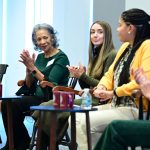
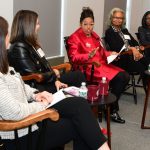
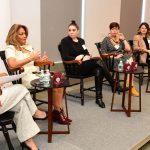
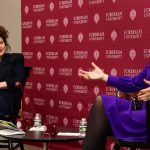

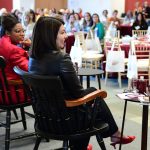
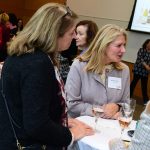
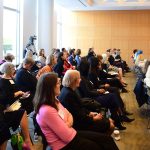 The sixth annual Fordham Women’s Summit, held at the Lincoln Center campus on Oct. 19, featured women leaders who were “firsts” in a variety of fields—the first woman president of Fordham, the first Black woman to serve as the board chair of the Ronald McDonald House Charities, women who were the first to work in the corporate social responsibility field, and women entrepreneurs who were the first to tackle a specific need.
The sixth annual Fordham Women’s Summit, held at the Lincoln Center campus on Oct. 19, featured women leaders who were “firsts” in a variety of fields—the first woman president of Fordham, the first Black woman to serve as the board chair of the Ronald McDonald House Charities, women who were the first to work in the corporate social responsibility field, and women entrepreneurs who were the first to tackle a specific need.
Despite their varied experiences, all of them shared a common desire: They wanted to make sure the doors they opened would stay open for the next generation.
That was one of the lessons that Fordham President Tania Tetlow said she learned from her late mentors, Congresswoman Lindy Boggs and Boggs’ daughter, journalist Cokie Roberts.
‘Smashing the Door Down’
“She really taught me that when you get to go through a door as a woman, that’s so hard-fought, sometimes there’s this temptation to think that the young women who are coming behind you are whining and they don’t really appreciate what they have and all of that—but she was determined to not just help them through that the door, but to smash the door down,” she said.
The power of mentorship and support also helped Adriana Trigiani, New York Times bestselling author, who led the keynote conversation with Tetlow. She shared three inspiring tips from her own mentor: “You got to pick the thing that you like to do. Then the second thing—you’ve got to be the best at it. And the third thing is to serve humanity.”
During a panel discussion on entrepreneurship, innovation, and transformation, Linda Dunham, PCS ’82, who is the president of Dunham Management Corp., an owner/operator of McDonald’s restaurants, and former chair of the Global Board of Trustees of Ronald McDonald House Charities, described how she put some of those tips into practice when a door opened for her to become the first woman—and also the first African American woman—to chair that board.
“I was proud that I had this opportunity—I just lost my mother and I was thinking, ‘Wow, I wish I could call my mother this morning and tell her I had my first board meeting and yes, I did everything you would have told me to do,’” she said.
Dunham said that she worked to make sure the board addressed critical topics, such as the importance of diversity in the charity and the need for people in leadership to receive the education they needed to excel in their positions. She also made sure that before she left as chair, they identified the next CEO, who was a woman, and the next chair, who was a Hispanic man.
“They continue to this day to make sure we are inclusive,” she said.
Those kinds of efforts are what Tetlow said the Women’s Summit was all about.
“We are here because we keep teaching each other, because we’re so determined to pay [the lessons] forward to the young women of Fordham and beyond,” she said.
Those efforts have already helped younger women like Nishi Akter, a junior at Fordham College at Rose Hill studying psychology and business administration. Akter and her family moved to the Bronx from Bangladesh when she was 12.
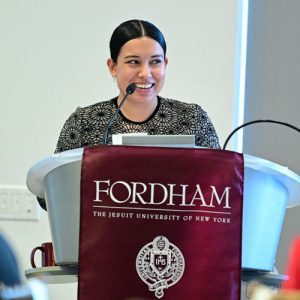
“As we settled in the Bronx, I struggled with the abrupt shift in language and culture while also navigating troubles at home, where money was tight,” said Akter, who also has a speech impediment.
In high school, Akter was placed in foster care, and by her senior year she was in a runaway homeless youth shelter.
“Nevertheless, I was committed to my education, and most importantly, to my 12-year-old self, who didn’t think she could ever break the cycle of poverty,” she said.
She said her dream was to become the first in her family to graduate from college; when she applied to Fordham, she received multiple scholarships to help her get started on that dream. Akter is a Christina Seix Dow Collegiate Science and Technology Entry Program scholar, a Portera Family scholar, and a Loyola scholar.
Akter told the audience she wouldn’t have been standing before them if not for women who had helped her along the way— with financial support, mentorship, and guidance.
“Thank you for continuing to invest in those who have come from nothing, for believing in them, and for giving them a chance to make a difference,” she said, drawing a standing ovation from the attendees.
Finding a Mission with Purpose
That chance to make a difference was what inspired many of the women catalysts for change who participated in the summit, including Kathleen Adams, FCRH ’10, GSAS ’12. Adams is the vice president and digital director ofEvolveMKD, a public relations and digital marketing agency in New York; the co-owner of Angel of Harlem Bar/Restaurant; and co-founder of Momma’s Hip Hop Kitchen.
Adams said Fordham’s commitment to being men and women for others made her think, “How can I be part of the solution?”
“Why don’t we do edutainment—education plus entertainment?” she said, describing the idea behind Momma’s Hip Hop Kitchen, an annual event showcasing female hip-hop artists—especially women of color—and providing a forum for women’s health issues, such as HIV/Aids. “Instead of just pamphlets, people are really leaving the event learning something new, but also getting access to services that they need.”
Being of service to the community is also what inspired Adams to open Angel of Harlem.
“I love being around others, I love hospitality, so it seemed like Harlem had great bars and restaurants, but not a ‘Cheers’ place—your neighborhood bar where you could go and everyone knows your name, so I wanted to create that environment,” she said. “It’s called Angel of Harlem because we want to be the beacon of hope in the community.”
Finding a passion like Adams’ is what Trigiani–author of 18 books and executive producer for shows and films, including Lifetime’s Emmy award-winning show Growing Up Funny—said she hopes for the more than 200 attendees attending the Women’s Summit: that they would walk away with a sense of their own creative possibility.
“If you are engaged in something that you love, it increases your energy, it increases your love for living,” she said.
For Lauren Sweeney, FCRH ’12, that something was the opportunity to make a tangible difference in a field that was a part of her everyday life—food delivery services.
“I was a busy single mom—I was working long hours and relied on the convenience of takeout delivery, and I would order from the same salad place and the same sushi place all the time, and would stand there with my red stout sushi containers, not sure if I could put them in recycling,” she said.
She knew the containers were ending up in a landfill so she thought, “This is a problem I want to solve in the world.”
That was the impetus behind Sweeney’s company, DeliverZero, a platform that allows you to order food from participating restaurants in reusable containers and then return those containers to the same restaurant or others.
“It’s been a bit of a ride—I can’t say that we pressed go in November 2019 [the month the platform launched] with a solution that would scale, but we proved that there is demand for it, and that has instilled a solution that makes it easy for restaurant operators, POS systems, delivery platforms, and customers to all being part of this reuse ecosystem.”
Tetlow emphasized that women leaders need to teach the next generation how to both find a purpose and to learn “effective activism”—how to really bring about meaningful conversation and change.
“How do you really sit at the table with complexity? How do you find a way to turn up the pressure from the outside, but also engage from the inside?” she said. “It’s all of that work, and to find your purpose in life—and we’re not going to tell you what it is, and it will be different across all the diversity, including ideological diversity of our students—but having that vocation in life of that thing that makes you excited.”

New World and Values
Having a company that is aiming to make a difference is essential to this next generation of workers, according to multiple women panelists. Companies that already are or have been doing this type of work, often referred to as corporate social responsibility (CSR), have a leg up, said Alison Whritenour, GABELLI ’11, CEO of Seventh Generation. Her company has been making sustainable products for many years.
“Our founders were lightyears ahead of their time, and really built the business on holding people, planet, and profit at the same time, which really was the inception of CSR,” she said.
In her role as CEO, she said that she strives to make sure they continue this work and that the next generation can see that it’s real and not just a slogan.
“We have a mission to transform the world into a healthy, sustainable, and equitable place for the next seven generations,” she said. “That truly is how we run the business—from decisions that we make in terms of what we put in our products to advocating and using our voice to amplify reasons for change and how we educate consumers.”
Meghan Simio, GABELLI ’13, director of PVH Foundation at PVH Corp., said that PVH, which is the parent company of brands like Tommy Hilfiger and Calvin Klein, has used its position to bring together brands to address some issues in the fashion industry. She helped PVH partner with the UN Foundation and the Gap initially to put together an industry-wide pooled fund to address women’s needs.
”We didn’t want it to be another COVID emergency fund—so many of those were popping up—we really wanted to address those kind of root problems that were making women so susceptible to these types of disasters in the first place, and making sure that we addressed those systemic challenges,” she said. “So the fund is focused on women’s safety, on bodily autonomy and sexual and reproductive health, and geographically focused in the regions where we have our supply chain—so India, Bangladesh, Vietnam, Cambodia.”
Jordan Catalana, GABELLI ’15, said that she was one of the first people who was able to “start their career in CSR as opposed to getting into it from other fields.” Catalana, who is a senior associate for foundation and social impact programs at Tapestry Inc., said that she’s seen the field shift in just the short time since she started in it, which was just out of college.
“When I started in 2015-16, the question I got from senior leaders was always, ‘Why should I care? Why should I care about the environment? Why should I care about communities?” she said. “The question has changed—it’s now ‘How do I care about the environment? How do I care about communities, and how do I care for our employees?’ It might seem small but the distinction is very real.”
Catalana, who is also an adjunct at the Gabelli School of Business, said that shift is partly due to consumers, shareholders, and the next generation of employees demanding those things from companies now.
Whritenour agreed.
“I think we all really need to hold businesses accountable for driving the changes that we need in the world,” she said.
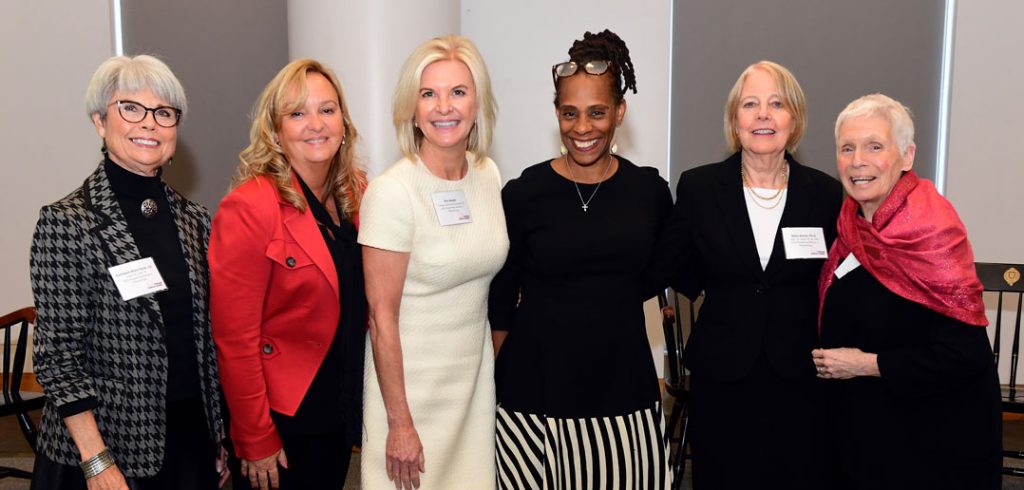
Recognizing Pioneering Women in Philanthropy
The Summit also served as a chance to recognize Fordham women who made a difference in the lives of others..
This year, seven women were recognized as Pioneering Women in Philanthropy for their impact on others: Kim Bepler, Fordham trustee, 2007 Fordham Founder’s Award recipient, and 2022 honorary doctorate recipient; Mary Byrne, Ph.D., TMC ’72, GSAS ’78, ’83, PAR; Joy Fernandez, GABELLI ’88; Kathleen Anne Ford, J.D., FCRH ’75, LAW ’78; Theresa Lim Mao, Ph.D. GSAS ’60, ’64; Ann Marino, R.H.S.M., MC ’63; and Anne Williams-Isom, FCLC ’86, Honorary Doctorate ’18, James R. Dumpson Chair in Child Welfare Studies, Fordham University Graduate School of Social Service.
The event concluded with a networking happy hour hosted by Gabriella Macari, GABELLI ’09, of Macari Vineyards, which sponsored the event along with EY and TIAA.
If you missed any of the sessions, check out our videos from the day.
]]>This year’s summit—to be held in Manhattan at Fordham Law School on Wednesday, October 19—will mark a return to the kind of in-person networking and community building that was a hallmark of this annual gathering prior to 2020.
The event, set to begin at 10 a.m. and conclude with a cocktail reception at 3:45 p.m., will bring together Fordham women who are transforming a variety of fields—from improving the hospitality industry to creating eco-friendly products to innovating in the financial sector—for the betterment of their colleagues and the world around them.
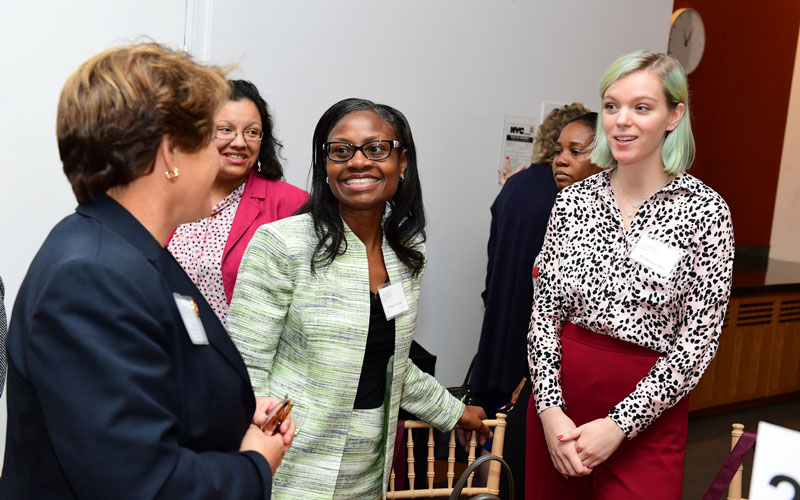
Fordham’s history-making new president, Tania Tetlow, will participate in an opening keynote conversation on women in leadership with Adriana Trigiani, a bestselling author, producer, and playwright USA Today has called “one of the reigning queens of women’s fiction.”
Participants then have their choice of two breakout sessions: a panel on entrepreneurship, innovation, and transformation, or a workshop on emotional intelligence and leadership.
Fordham Theatre program director May Adrales will moderate the panel, which will feature Kathleen Adams, FCRH ’10, GSAS ’12, vice president and strategy director for the ad agency FCB NY and a co-owner of the Manhattan bar and restaurant Angel of Harlem; Gloria Athanis, MC ’81, the owner and partner at Healthful Habits LLC—Phyter, a healthy food company; Linda Dunham, PCS ’82, president of Dunham Management Corp. and owner and operator of multiple McDonald’s restaurants; and Lauren Sweeney, FCRH ’12, co-founder and CEO of DeliverZero, which partners with local restaurants to provide reusable takeout and delivery containers.
Rachel Annunziato, Ph.D., professor of psychology and associate dean for strategic initiatives at Fordham College at Rose Hill, will lead the workshop. It’s designed to help participants learn how to foster greater emotional intelligence, in themselves and others, to diffuse conflict and build more gratifying relationships in the workplace.
A networking lunch follows the breakout sessions, and at 1 p.m., the University will honor several Pioneering Women in Philanthropy. The 2022 honorees are Kim Bepler, a Fordham trustee, who is also the recipient of the Fordham Founder’s Award and an honorary degree from the University; Mary Byrne, Ph.D., TMC ’72, GSAS ’78, ’83, PAR; Joy Fernandez, GABELLI ’88; Kathleen Ford, FCRH ’75, LAW ’78; Theresa Mao, Ph.D. GSAS ’60, ’64; Ann Marino, R.H.S.M., MC ’63; and Anne Williams-Isom, FCLC ’86, the James R. Dumpson Chair in Child Welfare Studies at Fordham’s Graduate School of Social Service.
In the afternoon, Kay Turner, vice president for human resources at Fordham, will moderate a panel titled “A View from the Top: Retention and Recruitment in the Great Reshuffle.” The discussion—featuring Marcella Barry, FCRH ’92, chief people officer at Phoenix Tower International; Gloria Isbell, GABELLI ’93, CEO and leadership coach at Aerial View Coaching & Talent Management Solutions, LLC; Jacklyn Quinn, FCRH ’08, head of human resources at Angelo Gordon; and Sheila Maith, PAR, principal at Maith Consulting and a professional certified leadership coach—will explore how companies and managers are responding to a realignment of professional and personal priorities, such as career aspirations and work-life balance, in a time of flux.
The final session, a keynote panel titled “A Spotlight on Corporate Social Responsibility,” will feature leaders focused on the impact of ethical business practices in their respective industries.
Lerzan Aksoy, Ph.D., interim dean and professor of marketing at the Gabelli School of Business, will moderate the discussion. Panelists include: Jordan Catalana, GABELLI ’15, senior associate of foundation and social impact programs at Tapestry Inc.; Arlene Isaacs-Lowe, GABELLI ’91, board director of the Compass Group, Xenia Hotels and Resorts and Equitable Holdings, and a former global head of corporate social responsibility for Moody’s Corporation; Meghan Simio, GABELLI ’13, director of PVH Foundation at PVH Corp.; and Allison Whritenour, GABELLI ’11, the CEO of Seventh Generation.
Following the panel, attendees are invited to a networking and cocktail reception hosted by certified sommelier Gabriella Macari, GABELLI ’09, of Macari Vineyards.
Tickets are limited and cost $100 for the full day. Learn more and register at fordham.edu/womenssummit.
]]>Under the theme “Philanthropy | Empowerment | Change,” the morning’s keynote speaker, financial journalist and author Stacey Tisdale, MC ’88, spoke specifically about how priorities have been upended by workers during the pandemic, with women leading the charge for better work/life balance. Indeed, as the day progressed, panelists spoke of a balance struck by necessity, often on Zoom in the kitchen with the kids across the table.
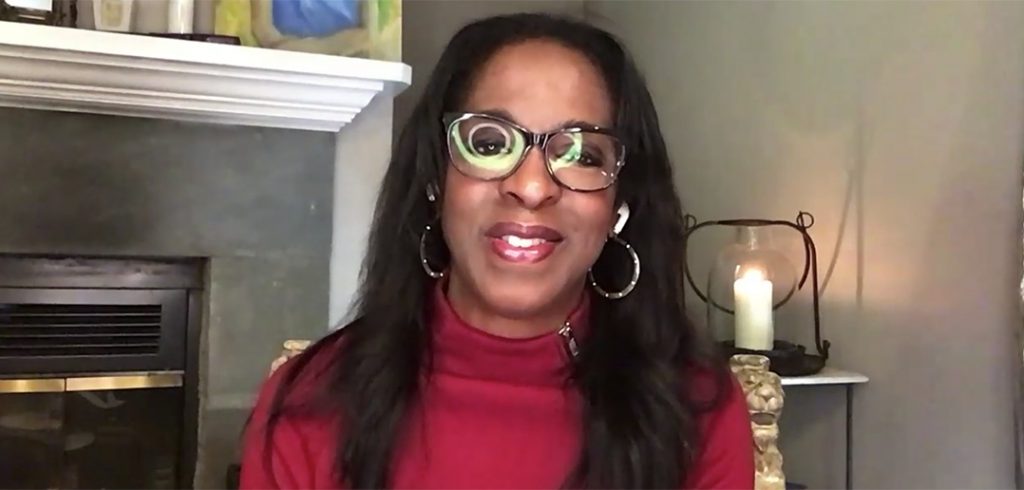
“Women are heads of households, even though we’re certainly not treated that way,” said Tisdale, speaking to hundreds of virtual attendees. “Women participate in the provider side of the financial equation much more than they used to, but the belief that it is a man’s job to provide for his family and it is a woman’s job to take care of her family is still common.”
Tisdale noted women control over 60% of all the personal wealth in the U.S. and a majority of the personal wealth in the world. Yet, only 22% of women rate themselves as very well prepared for financial decision-making.
“There’s a confidence gap here we’re talking about,” she said. “Women were not always taught to be empowered in our financial decisions. I’m challenging you to go a little bit deeper. Where do you want things to change?”
She challenged viewers to examine self-perceptions.
“You are already perfect. If you don’t believe this, it is due to a flaw of your understanding,” she said. “Get rid of this understanding and you will become rich. Know that you’re born with the ability to accomplish things. The numbers stuff is the easy part.”
Fordham College at Lincoln Center junior Jayda Jones told attendees how scholarships
made her journey at the University possible.
Being Vulnerable and Promoting Empathy
In a panel following Tisdale’s talk titled “Compassionate and Collaborative Leadership in the Workplace,” Fordham Law adjunct professor Katherine Hughes, LAW ’08, GSAS ’08, said that having her kids doing schoolwork across the table while she met colleagues on Zoom changed her perception of leadership.
“I think that part of being a leader now is to show those pieces of myself and show my vulnerability,” she said, adding that wearing her heart on her sleeve has made her an empathetic leader.
“You forget that you’re dealing with people sometimes, one of the silver linings [of quarantine was that]I was forced to see people as people,” she said.
Eventually, however, the kitchen became far too small. She now works from her basement to create a perceived separation from home life with an up-the-stairs commute for dinner.
Christina Luconi, PAR, chief people officer at the cybersecurity firm RAPID7, concurred that creating personal space remains key for those working virtually. She breaks up her day with a long run to put herself in the “right headspace for the day.” Fellow panelist Peggy Smyth, FCRH ’85, said that she too needs long walks to as a break from being “a short-order cook” for her athlete sons and being the U.S. senior advisor on global infrastructure for QIC, the Australian investment firm.
Marjorie Cadogan, FCRH ’82, LAW ’85, said that while she agreed that creating space between work and life in the virtual workplace is important, she said virtual meetings have broken down a perceived wall.
“One of the great things for me was to be able to see work as a part of life,” she said. “Work is a piece of a whole and you really do have to understand that you have to work with the whole [of life]to get the best of the piece.”
In the chat, she elaborated.
“You have to talk to people about their own relationships, hobbies, activities that are important to them and hopefully be able to share those important priorities,” she wrote. “The communication issue is a big one, because people communicate in different ways. Sometimes you just have to tell people what you need and what style of communication you respond to best to deliver your best work or response.”
Getting Real: Leadership Amidst Pain
In an afternoon panel titled “Compassionate and Collaborative Leadership in the Community,” Kimberly Hardy-Watson, FCRH ’84, president and CEO of Graham Windham, a nonprofit working with families in the city’s underserved communities, brought the brutal realities of the pandemic home.
“I have had to say goodbye to 52 people in this time frame and I’m not an anomaly. Whole communities were impacted by the loss and I’m still finding out who we lost,” she said, adding that the deaths have made everyone reframe priorities.
“I’m pleased at the pushback, [workers]are voting with their feet and saying that work life/harmony is important,” she said, noting that many workers are looking for new jobs in what was referred to as the Great Resignation.
Yet, Hardy-Watson admitted that even she was reticent to reveal everything she was going through during the pandemic. She contracted the virus herself, and with so many people depending on her, she coped with it in silence. Eventually, she stepped back and acknowledged what was going on.
“There’s a level of authenticity that has happened in this time that I haven’t seen in a while and there are huge opportunities in that,” she said.
Jane Abitanta, GABELLI ’85, ’86, concurred.
“I feel that the pandemic has cracked hearts open, she said, adding that communication had been more authentic and honest. “But not everyone feels ready to move forward. There’s that idea that we want to create normalcy and that’s not going to be easy for everyone to do—and I’m not even sure that’s a good idea.”
In her role as founder and CEO at the communications firm Perceval Associates, Abitanta recently spoke to a high-ranking real estate investor who said his firm was underwriting a financial plan that forecasts a pandemic every five years.
“We’re in a chronic crisis mode and have to get even more creative in virtual communication and in person, but not everyone is ready for that,” she said.
Naelys Luna, GSS ’01, ’05, founding dean of the College of Social Work and Criminal Justice at Florida Atlantic University, agreed that even leaders need to acknowledge that they’re experiencing trauma.
“[T]he process of becoming a leader is much the same as becoming integrated human beings; many times we spend a tremendous effort of putting out fires and when you put that together with the chronic stress [of the pandemic]—and certainly we all feel it—it puts you in a reactive mode and that alters the way you see things.”
Giving as Your Authentic Self
Joan Garry, FCRH ’79, former executive director of the gay rights organization GLAAD, who now runs her own nonprofit consulting firm, said that the authenticity one sees emerging in the workforce has permeated all sectors of the economy, including nonprofits and philanthropy. But it’s not a new concept, she said. It’s one she learned at Fordham.
“As our Jesuit values remind us, we are women for others,” she said. “So, take a look in the mirror, you’re staring at an activist.”
She noted that women make 90% of the philanthropic decisions for the nation’s families. Indeed, many of the attendees said they already belonged to one of Fordham’s Giving Circles, which allow donors to give regularly—starting at $100 a year—to any area of the University, from STEM funds, to a mission-focused fund called Living the Mission, to particular colleges or graduate schools.
Indeed, in her own family, she and her wife spearheaded a giving circle among her children and their cousins. The kids decided to give to a wildlife foundation. When the foundation sent a stuffed polar bear to the house as a thank you gift for giving, her son was furious. He wanted all the money they gave didn’t go to real animals.
She referred to the get-something-for-giving scenario as the “Girl Scout Cookie Syndrome.”
“It’s all about the thin mints,” she said. “Even the well-informed people who know about the great work of Girl Scouts develop some form of sugar amnesia.”
She equated the so-called cookie syndrome to inauthentic special events pegged to bold-named celebrities rather than the cause, leading some attendees to have no idea what they’re supporting. She pointedly excluded the Fordham Founder’s Dinner, which she said brings the mission of the evening to life.
“This pandemic has changed all of us in ways we do not yet understand,” she said. “We need to look at everything with intention to make sure our life has meaning and purpose.”
And that includes philanthropy, she said.
“We have to give with an understating of our privilege and with a sense of joy.”
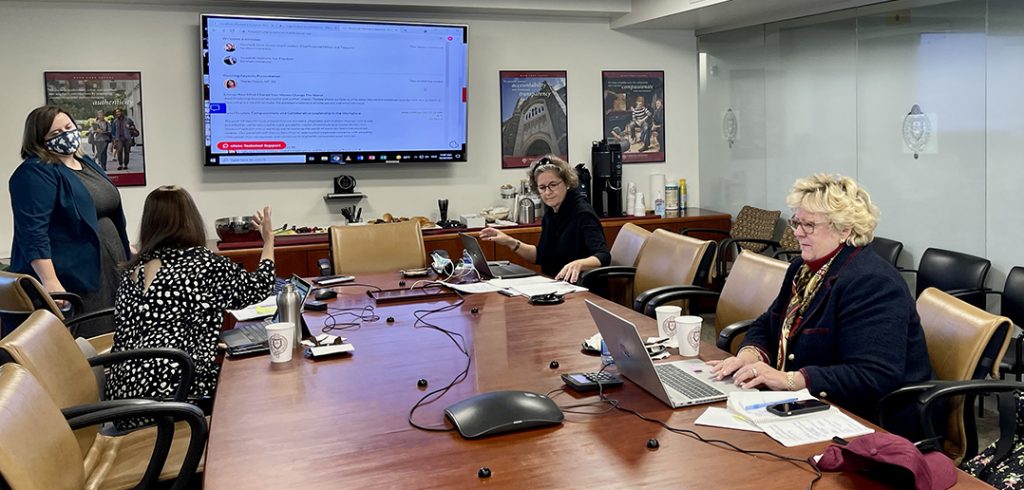
]]>
“I saw how much pain and suffering people’s financial lives are causing [them],” she said, despite their efforts to stick to a budget and “create financial security.”
Tisdale, a 1988 graduate of Marymount College (the Tarrytown, New York, women’s college that was part of Fordham University from 2002 until it closed in 2007), said she felt many financial experts were overlooking—or underestimating—the “psychological and emotional toll of financial stress.” She saw a disconnect between consumers’ good intentions and “how our economic system works.”
She wanted to get down to root causes, so she spent six years researching consumers’ financial behavior, interviewing experts such as clinical psychologist James Prochaska, Ph.D., and collaborating with financial adviser Paula Boyer Kennedy to write a book, The True Cost of Happiness: The Real Story Behind Managing Your Money (Wiley, 2007).
One of the things she found is that our financial decisions can “really reflect … where you are—and if you’re not living in step with your priorities.”
“Money’s almost like a palm reader,” she said. “You learn a lot about someone if you look at their financial choices, their financial life.”
Tisdale wrote The True Cost of Happiness to help people bring their decisions in line with their priorities. She plans to share some of that wisdom during the fifth annual Fordham Women’s Summit, to be held virtually on Wednesday, Oct. 20. (Update: Watch Tisdale’s address at the Summit.)
She also wants to draw on her personal story to help attendees examine the various experiences and influences that have shaped their financial lives.
“For me, experiences that I’ve had—being born a Black woman, growing up with a privileged life and finding myself a lot of times in racial isolation, and trying to build career as a Black female financial journalist—I didn’t really feel like I fit into any group, and so I had to look deeper into dimensions of myself,” she said, to understand how all of those things affected her approach to money and to making financial decisions in line with her priorities.
The True Cost of Happiness was published in late 2007, right at the start of the Great Recession, which inspired many people and groups to contact Tisdale for advice. The White House asked her to develop a behavior-based financial education program for students at historically Black colleges and universities.
“That’s maybe where my lightbulb went off,” she said, and she began to feel a call to “educate and teach.”
Shortly after her book was published, Tisdale took that calling to the next level. With fundraising help and support from NFL Hall of Famer Ronnie Lott, she launched Winning Play$, a program that aims to teach students how to create positive relationship with money and how to manage it effectively. The program won an Excellence in Economic Education from the U.S. Department of Education in 2010.
Tisdale is also the founder and CEO of a multimedia company, Mind Money Media, that aims to educate people about the complex psychology of money, including how socioeconomics, gender, race, age, sexual orientation, and culture affect our financial experiences.
“People don’t get much education in how to navigate those deeper aspects of ourselves, and that’s what I hope to show people how to do,” she said.
Fordham Magazine spoke with Tisdale in advance of her keynote address at the Women’s Summit.
How did you get interested in financial behavior?
When I worked on Wall Street, I really saw how the financial system worked and how that integrated into the community, into our lives. And my first job in journalism was at The Wall Street Journal. That really immersed me into how businesses work, from the inside out. When I went to CBS, it was a total 180: I was immersed into the financial experience of human beings. Having seen all that intersectionality, I saw how much pain and suffering people’s financial lives are causing them—money is the leading cause of depression, the leading cause of substance abuse, the leading cause of divorce.
Why did you want to do all this research into financial behavior?
Money works very simply: Don’t spend more than you have. Don’t borrow more than you can afford to pay back. Don’t invest more than you can afford to lose. But I can also see this disconnect between the intentions of consumers to create financial security and how our economic system works. They don’t coincide very well, largely because people place a big focus on the monetary side of money when the psychological and emotional toll of financial stress is really causing problems.
What did you learn from your research?
The problem became clear: We live our financial lives largely through conditioning—I call it the “money script.”
There really are three major areas: the childhood script—the way we saw money handled, or not, managed or not, growing up; social scripts—the messaging we see that our brains literally process and that we get our sense of identity from; and social messaging around gender and race—what our behaviors are “supposed to be.”
I was able to identify real skills to navigate this positioning, to help people learn to see what those messages are that we tell ourselves about money, so that we can rewrite scripts where they don’t serve us. That means having a visceral connection to what your true goals and priorities are, and what is important to you. When you connect your financial behavior to that, you’ll generally see that you spend a lot of time and money on things that are not authentically important to you, and you will find that you have a lot more resources for what really matters.
How did your time at Marymount influence you and your career path?
It was just such a supportive environment and an environment where it was so natural for women to be all that they can be. I came to Marymount after a pretty traumatic experience—I had been a figure skater, and I was vying for a spot on the U.S. national team. I left home when I was 11 years old to go live and train with coaches. And I got into a car accident, which ended my skating career. I went straight to college, to Marymount. It was just such a transitional time for me, so to be in such a safe and nurturing place where learning was fun, relationships were forged—that was what I needed.
What do you hope to share during your keynote speech at the Fordham Women’s Summit?
I think just taking responsibility. When we think of philanthropy, we tend to think of what we want to affect, but [it’s also about] taking responsibility and owning your power when it comes to outcomes.
We have, I think, the biggest mass exodus from the U.S. workforce in history. It started before the pandemic, but since the pandemic, a lot of people are just walking away from their jobs. They’re calling it the Great Resignation, but it’s also the Great Realization. When people were really forced to be in their lives, they saw how they spend their time, their priority, and how they were living was not adding up. So we’re saying a collective “no,” and the change that that’s causing in the workforce is amazing.
So, when people think about giving [and how they can use their financial power for good], I want them to think more about how can they be more demanding in terms of what they want to see happen.
Interview conducted, edited, and condensed by Kelly Prinz, FCRH ’15.
Watch the Fifth Annual Fordham Women’s Summit. Tisdale’s keynote address begins at 16:30.
]]>“I think one of the reasons you’re here is to make the world a better place than the one you arrived to,” she said. “And philanthropy is an incredibly powerful tool for that. I want the women at the Women’s Summit to own that. I want them to see that. I want them to evangelize that.” (Update: Watch Garry’s address at the Summit.)
Making the World a Better Place
For Garry, the desire to make the world a better place stems, in part, from her personal life. In the early 1990s, two decades before the Supreme Court’s decision in Obergefell v. Hodges legalized same-sex marriage, she and her partner, Eileen, were discussing the next steps for their family.
“I believed really deeply that if we were going to have a family that it was incumbent upon us to do what we could to make the world as safe as possible for them,” she said.
They became plaintiffs in a precedent-setting case in New Jersey in 1993, and Garry eventually became the first woman in the state to legally adopt her partner’s biological children.
“It was a huge ‘aha moment’ for me, recognizing, cheesy though it may sound, that one person can really make a difference,” she said on an episode of the Fordham Footsteps podcast last summer. “And it was huge news,” she added. “The story of our family was educating people about members of the LGBT community in a very different kind of way. In the early 1990s, gay families were not common at all, and I realized that the media had this incredible power and responsibility to tell these stories and really shape how the LGBT community was perceived and understood.”
At the time, Garry was an executive at Showtime Networks, but her family’s victory in court inspired her to take her career in a different direction a few years later. In 1997, she was named executive director of GLAAD, a national nonprofit organization that aims to “rewrite the script for LGBTQ acceptance” and tackle “tough issues to shape the narrative and provoke dialogue that leads to cultural change.”
“Because GLAAD focused on the media as an institution where we could change hearts and minds, the bridge from corporate media to the nonprofit sector was a no-brainer for me,” Garry said.
Garry said that when she started at GLAAD, there were “precious few images at all” of LGBTQ people in the media, and when they were featured, the depictions were usually negative. She built partnerships with media executives to change that, working with the producers of Survivor to help get a gay man on the popular TV show in 2000 and successfully lobbying The New York Times to feature gay and lesbian couples in its “Vows” section.
“We are part of the fabric of society,” she said. “The object of the work was to ensure that the media representation reflected the diversity of our society that included LGBTQ members.”
Lessons Learned
Garry said her work at GLAAD was influenced by her previous jobs, particularly at MTV, where she began her career soon after graduating from Fordham College at Rose Hill with a degree in philosophy and communications.
At MTV, Garry learned the “dynamics, energy, and the urgency of a startup,” which became valuable to her as she transitioned to leading GLAAD.
“Running a nonprofit organization, they have a very similar energy [to a startup]—moving quickly, often too quickly, under-resourced,” she said. “The other piece that corporate America provided me was an understanding that numbers tell a story.”
And even before MTV, while still a student at Fordham, Garry said she learned about the value of having a mentor.
She got her start at MTV, several months before the network launched in 1981, thanks in part to her mentor James N. Loughran, S.J., FCRH ’64, GSAS ’75, a Fordham philosophy professor who later served as dean of Fordham College at Rose Hill. Father Loughran encouraged her to reach out to a Fordham graduate who was looking to build a team for a new project at Warner Communications.
“All I know is that one moment I was unemployed, and the next moment I was sharing an office with someone and looking at the Christmas tree at Rockefeller Center, and feeling like I had won the lottery,” she said with a laugh. “Little did I know that we were creating the business plan for what would become MTV.”
The ‘Accidental’ Consultant
All of those lessons helped prepare Garry for another career transition—starting her own consulting firm for nonprofits.
After working at GLAAD for eight years, Garry decided to focus more on helping raise her three children, who were in middle and high school at the time.
“We believe that older kids need you even more than younger kids,” she said with a laugh. “And so I went home to be on the ground when they got home from school.”
She began to take on some jobs as a way to “maintain my sanity,” Garry said, adding that she became an “accidental” consultant. In 2012, she launched a website to share tips, advice, insights, and lessons she learned from her time in the corporate and nonprofit worlds. The site “took off,” she said, and eventually led to a full-time consulting business and a book, Joan Garry’s Guide to Nonprofit Leadership: Because the World Is Counting on You (Wiley, 2017).
Garry said that she found that many nonprofit leaders don’t have advocates and supporters for their work, which is why she also launched the Nonprofit Leadership Lab to help provide support, networking, and professional development to leaders of nonprofits.
“These jobs—whether you’re running a food pantry or whether you’re researching the cure for a disease or you’re advocating for the Latinx community—these are hard jobs,” she said. “They’re really hard to get right and far too often these leaders do not have champions.”
Inviting People In
Garry said that one of the pieces of advice she plans to give those who attend the Summit, and one she often shares with nonprofit leaders, is to invite people in to be a part of their causes and work.
“It makes people feel good to give money to causes they care about—it is an invitation, an invitation to get closer to those things that drive meaning and purpose in your life,” she said. “And why wouldn’t you invite people to do that? They can always say no. But I’d like to be invited. And so I have grown to understand through all of the work that I have done raising money, that it is [about] offering someone the opportunity to bring meaning and purpose into their lives in a different way.”
In particular, Garry said that she wants to invite women to use philanthropy to support the causes they care about.
“Women have not been socialized in the same way as men to be philanthropic; they have had fewer opportunities,” she said. “And I would like them to leave feeling inspired to be engaged in philanthropy in whatever way it makes sense for them.”
Watch the Fifth Annual Fordham Women’s Summit. Garry’s keynote address begins at 3:44:20.
]]>Now in its fourth year and formerly known as the Women’s Philanthropy Summit, the Oct. 21 event offers alumnae, faculty, and friends a chance to discuss and celebrate their achievements and attend professional and personal development sessions.
Byrne, a clinical psychologist practicing in Eastchester, New York, will lead one of those sessions, along with Maria Nardone, GSAS ’79, ’82, and David Marcotte, S.J., Ph.D. During “Building Personal Resilience: Yes I Can! Yes We Can!” she said she’ll address the importance of taking responsibility for what we can control in life, and encourage attendees to “find meaning and satisfaction in seeking to do the right thing, even when it is difficult to do so.”
A Legacy of Giving Back
This is the first year that Byrne has been involved with the Women’s Summit, but she’s no stranger to volunteering her time in service of the University. An alumna of the Graduate School of Arts and Sciences (GSAS), where she earned a doctorate in psychology, Byrne has served on the GSAS Advisory Board and been a member of the Dean’s Leadership Committee (DLC) for about 15 years.
In a normal year, that would mean attending annual meetings on campus and several other in-person events throughout the year. But this year, those gatherings are being conducted virtually, and Byrne, who serves on the nominating committee for new members of the Dean’s Leadership Committee, said she still enjoys talking with “other graduates of GSAS who are enthusiastic about the school and joining DLC.”
She’s also involved with the new GSAS wellness initiative, which offers “various types of support to graduate students, including counseling, social support, and career guidance.” For now, much of that support, which is also targeted to combat stress related to COVID-19, is delivered virtually.
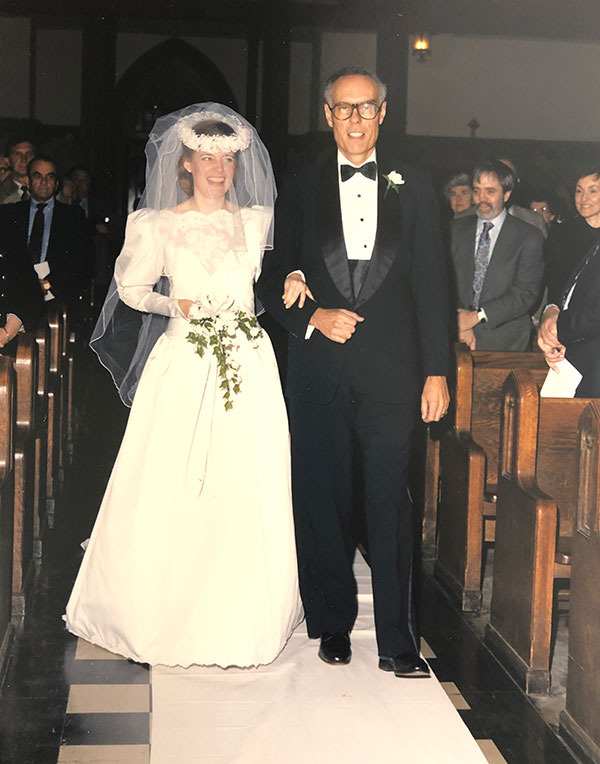
While the pandemic has certainly changed her responsibilities a bit, her desire to “pay it forward”—sometimes literally—has not. As someone whose three Fordham degrees were largely funded through scholarships and grants, Byrne said that she “always knew that once I was able to do so,” she would contribute to Fordham.
“My husband and I made the lead contribution for a scholarship in honor of Marvin Reznikoff, who mentored my Ph.D. and also walked me down the aisle when I got married,” she said.
Byrne and her husband established the scholarship in 2009 to support doctoral candidates in psychology and honor Reznikoff, who died in 2013. (She has also shared her love of Fordham with her son John Rogan, FCRH ’10, LAW ’14, a two-time Fordham grad who is currently a visiting clinical professor of law at the Fordham School of Law.)
Byrne may have known early on that she wanted to give back to Fordham, but she didn’t always know she wanted to be a psychologist. A few years after graduating from Thomas More College (Fordham’s liberal arts college for women from 1964 to 1974), she decided “that being a psychologist would be interesting and engaging and also a worthwhile career to pursue.” Now, at her private practice in Westchester County, Byrne works mostly with adult women who have depression or anxiety disorders.
“I was amazed at how quickly my patients and I adjusted to the phone and how well therapy has been going for most people,” she said. “During the shutdown, I think people had more time to focus on therapy issues between sessions so that they made better progress in therapy.”
During the Women’s Summit, Byrne and her fellow panelists will delve into that trend, teaching attendees how to develop and maintain resilience in these uncertain times.
“We have to accept the circumstances of life that we cannot change and find meaning in how we choose to respond to those circumstances,” she said. “To [paraphrase]Victor Frankl: It is not about what we expect from life, but what life expects from us.”
Fordham Five (Plus One)
What are you most passionate about?
Motherhood is the thing I have been most passionate about. I have two young-adult sons and nurturing and watching them grow from birth onward is the best thing that has ever happened to me.
What’s the best piece of advice you’ve ever received?
The best piece of advice I have been given came from my best friend in high school. She suggested that it would be a good idea to get a Jesuit education. I went to Fordham, and that decision has had a tremendous positive impact on my life.
What’s your favorite place in New York City? In the world?
My favorite place in New York City is on the Staten Island Ferry with the view of the Statue of Liberty, the skyline, and the harbor. My favorite place in the world is Robert Moses State Park on the beach.
Name a book that has had a lasting influence on you.
My favorite book is Man’s Search for Meaning by Viktor Frankl. Frankl wrote this book after surviving three years in Nazi concentration camps. His message is that while we cannot always control the circumstances of our life, we can control how we respond to those circumstances. It is up to us to figure out how to act responsibly and find meaning in life—even when that process is demanding and challenging and involves suffering.
Who is the Fordham grad or professor you admire most?
My mentor Marvin Reznikoff is the Fordham professor I admire the most. He was a distinguished, talented academic who gave wonderful guidance and made the dissertation process as easy as possible. More importantly, he was an honorable, very kind, and attentive person who was a great model for what a psychologist should be.
Women are more likely to feel compounded economic impacts, adverse health effects due to the reallocation of health care resources and priorities, and an increase in unpaid “care work,” such as taking care of children or elderly parents, the report concluded.
That’s one of the reasons why this year’s Fordham Women’s Summit: Philanthropy | Empowerment | Change will feature panels and speakers addressing financial literacy, COVID-19 work trends, personal resilience, and modern home economics.
“The Fordham Women’s Summit is a unique opportunity for Fordham alumnae, faculty, and friends to discuss and celebrate their achievements as leaders, activists, and philanthropists, as well as attend professional and personal development sessions,” the event description reads.
The fourth annual summit, which will be held virtually for the first time, will take place on Wednesday, Oct. 21, beginning at 10 a.m. EDT.
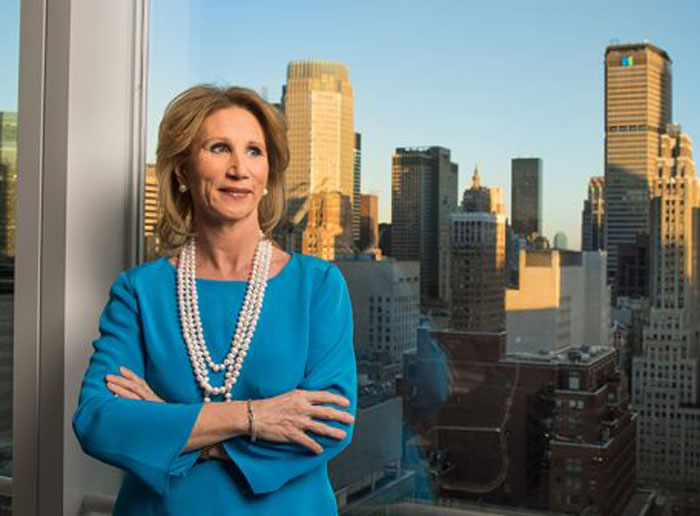
Mary Ann Bartels, GABELLI ’85, GSAS ’92, who most recently served as the head of the Research Investment Committee and exchange-traded fund strategy at Bank of America Securities, will be the keynote speaker.
Bartels said through her talk she will aim to “encourage and empower women to achieve financial freedom,” and to help them understand their impact and force in the economy, and how they can learn to use that power to support causes and philanthropic interests that matter most to them.
A series of four panel discussions will offer attendees concrete strategies to deal with the current economic and social stresses:
Building Personal Resilience: Yes I Can! Yes We Can!
Career Outlook: COVID-19 Trends & Perspectives
Perfection Intervention: Finding Strength in Letting Go
“Who’s the Boss?”: Perspectives on Modern Home Economics
The summit will also honor three Pioneering Women in Philanthropy at Fordham—Regina Pitaro, FCRH ’76, managing director of GAMCO Investors Inc.; the late Mary Heyser, R.S.H.M., MC ’62, former Marymount College alumnae chaplain; and the late Monica Kevin, O.S.U., UGE ’48, GSAS ’61, ’64, a longtime biology professor who was the first woman to lead the Faculty Senate at Fordham.
This year’s virtual summit is free to attend, but summit organizers encourage attendees to consider supporting Fordham students by joining a Women’s Giving Circle or making a one-time gift to another area of the University. For more information and to register, visit fordham.edu/womenssummit.
]]>“I didn’t realize it then,” she says, “but now I see that there’s been a theme in my life of championing women, and that started there.”
Welker, who graduated from Marymount in 1988, likes to say that her alma mater found her twice—once as a public school-educated student who didn’t expect to attend a Catholic, all-women’s college, and again in the early 2000s, when she was asked to join the college’s alumnae board.
“I joined just as Marymount was beginning its relationship with Fordham,” Welker says. “I felt very privileged to be a part of the process of redefining what the face of Marymount would look like through its partnership with Fordham.”
Though Welker admits that the initial transition was difficult (Marymount became part of Fordham in 2002 and closed in 2007), she celebrates the schools’ lasting connections. “Fordham is a collaborator for Marymount and a champion for women. The schools share a goal of empowering the next generation of women and female leaders. And they share a similar educational value system.”
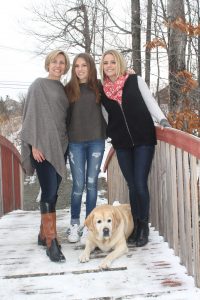
That value system—of caring for others and valuing empathy in leadership—is something Welker has brought to her own work.
“I always tell my daughters, if you are fortunate as I have been to be able to merge your personal and professional value systems, run, don’t walk, toward that opportunity,” she says.
“I was able to do that starting with my first job at Ladies Home Journal, whose mantra was ‘Never underestimate the power of a woman.’” Welker rose to become the magazine’s ad director in less than a decade, and in 1999, she joined Hearst to help launch CosmoGirl! a spin-off of Cosmopolitan magazine for young women. As the founding publisher, she came up with the magazine’s branding: “Born to lead.”
Welker has been a pioneer at Marymount too. Almost 10 years ago, she helped establish the Marymount Endowed Legacy Fund with Patricia Cole, MC ’74, GSS-GABELLI ’15, and Margaret Fitzgibbon Watson, MC ’72, GSE ’73. Since then, many other Marymount alumnae have contributed to the fund, which has grown to almost $1 million and in the process supported 11 Fordham students—all women with some connection to Marymount—with scholarships.
“As members of the founding committee, we seeded the fund,” Cole says. “Kristine is an energetic and tremendous leader who really followed through and got things sewn up. We’re all so delighted by how far it’s come.”
Welker says their goal “was always more than just supporting as many women as possible with scholarships. We also wanted to support them at a higher level. That’s why I’m excited about the upcoming Women’s Summit at Fordham, which I think will transcend schools, ages, and industries.”
Welker and her fellow Marymount Alumnae Association board members are helping plan Fordham’s inaugural Women’s Summit, expected to take place on the Lincoln Center campus this year. Beyond focusing on networking and philanthropy, the event organizers hope to encourage attendees to come together to create positive change—at Fordham and beyond.
That same goal has always motivated Welker in her own career. It’s why she unexpectedly left CosmoGirl! at the height of its success to head up Hearst’s new digital division, why she continued on to Dr. Oz The Good Life magazine, and why she took a break from publishing last year to pursue nonprofit work as a member of the Muscular Dystrophy Association’s board of directors.
“Whatever comes next, I want it to be at the intersection of female leadership and tech, and I want to keep adding social value,” Welker explains. “Sometimes as women, no matter our age, we don’t give ourselves permission to take opportunities. I want to empower the next generation of women to step out of their comfort zone, trust their instincts, and do things differently.
“My hope is that my daughters and all the other young women out there will be empowered to be the next generation of—fill in the blank. Whatever it is, it’s theirs to fill.”
]]>